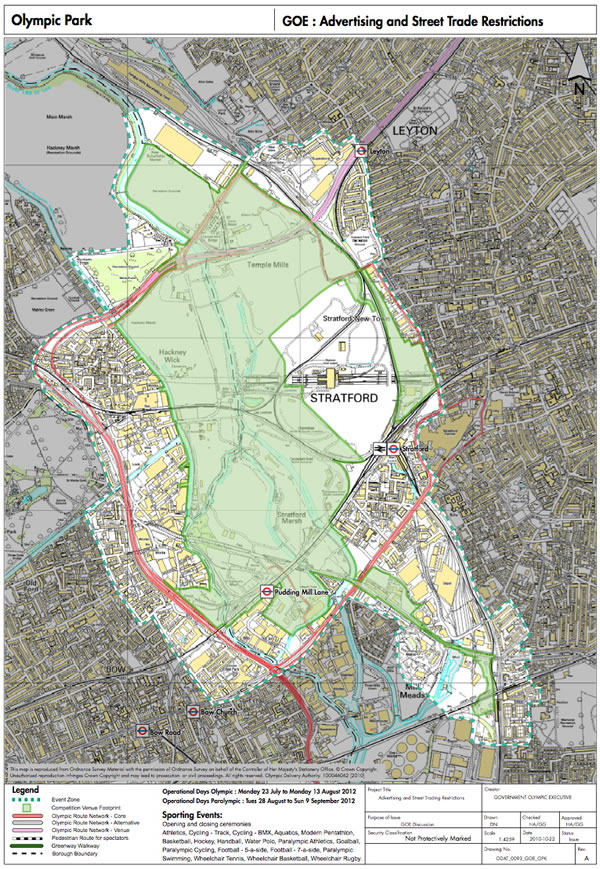
In graphic design, an 'exclusion zone' is an area around a logo which must be left clear. Corporate brand and logo usage guidelines demonstrate the proportion of vertical and horizontal space around a logo into which no other element can intrude.
In urban design, exclusion zones are becoming commonplace in relation to sponsorship of sporting events. The Brand Exclusion Zone is the newest form of urban demarcation, and can be used not only to affect signage and advertising, but also restrict personal freedom of choice. Within this context, the London 2012 Olympics represents one of the most radical restructuring of the rights of the city in London. The 'canvas' of London will belong exclusively to the Olympic marquee brands.
In essence, London has abdicated all rights and responsibilities to the International Olympic Committee, and implemented legislation which creates radical new spatial demarcations not only within the Olympic Park, but because of the distributed nature of the Olympic venues, across the whole of central London. London has surrendered the traditional rights to the city to the demands of the Olympic 'family' and their corporate paymasters. What the IOC want, London will give. London will be on brand lockdown.
The most carefully policed Brand Exclusion Zone will be around the Olympic Park, and extend up to 1km beyond its perimeter, for up to 35 days. Within this area, officially called an Advertising and Street Trade Restrictions venue restriction zone, no advertising for brands designated as competing with those of the official Olympic sponsors will be allowed. (Originally, as detailed here, only official sponsors were allowed to advertise, but leftover sites are now available). This will be supported by preventing spectators from wearing clothing prominently displaying competing brands, or from entering the exclusion zone with unofficial snack and beverage choices. Within the Zone, the world's biggest McDonald's will be the only branded food outlet, and Visa will be the only payment card accepted.
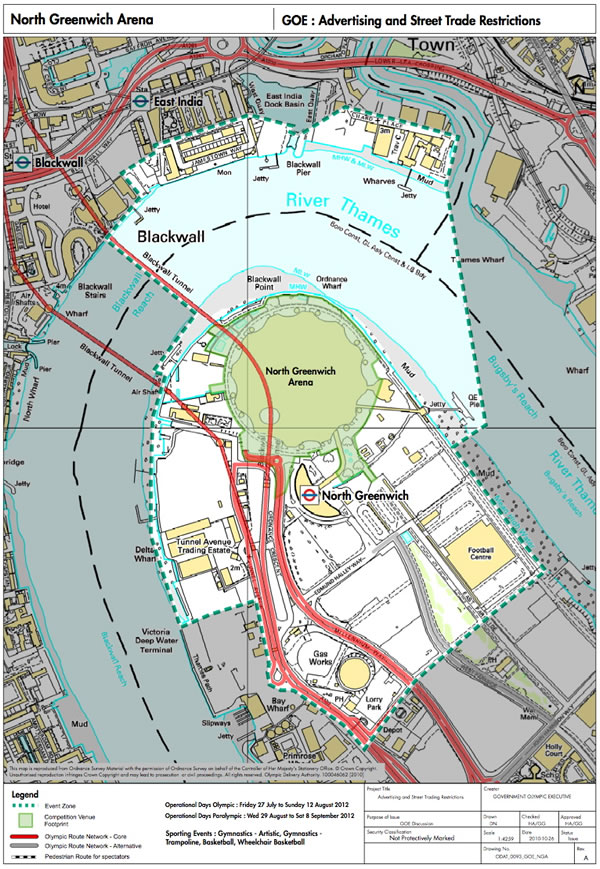

This brand apartheid is designed to prevent "ambush marketing", the gaining exposure of an brand through unofficial means. One of the best known examples of this was in the World Cup in 2010, where a bevy of 36 Dutch beauties in orange dresses provided by Bavaria beer gained considerable media attention, to the chagrin of the official World Cup beer, Budweiser. At London 2012, branding 'police' will be on hand to ensure that nothing like this happens, with potential criminal prosecutions against those responsible. Organising committee LOCOG will also take steps to ensure that no unofficial business tries to associate itself with the Olympics by using phrases like 'London 2012', even on such innocuous things such as a cafe menu offering an 'Olympic breakfast'. The Olympics authorities are looking to control both language and space.
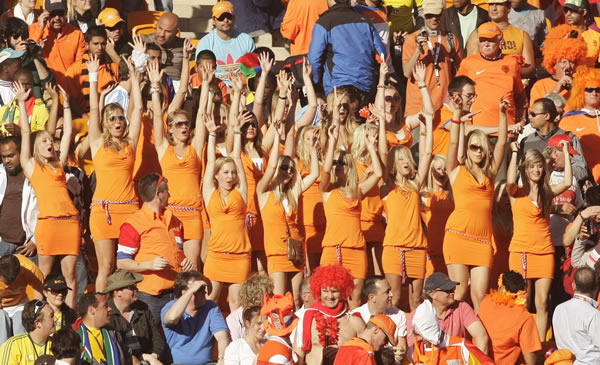
And it's not just London. All the venues for the 2012 Olympics will be on brand lockdown. In Coventry, even the roadsigns will be changed so that there is no reference to the Ricoh Arena, which is hosting matches in the football tournament. Even logos on hand dryers in the toilets are being covered up. The Sports Direct Arena in Newcastle will have to revert back to St. James Park for the duration of the Olympics.
Traditionally, the most epic guerrilla marketing war has taken place between sportswear rivals Nike and Adidas. Whereas Adidas has long been an official sponsor of major sporting events such as the World Cup and the Olympics, Nike has cast itself as the hip, streetwise alternative, and taken considerable steps to trump Adidas in gaining exposure at major sporting events.
1996 was ambush marketing's breakout year, with Nike making a concerted effort to upset the official sporting sponsors of both the Euro 96 football tournament in England and the Olympic games in Atlanta:
"The 1996 edition of the European Championships, Uefa’s premier international quadrennial soccer tournament, provided an example of ambush marketing that changed the face of sports sponsorship. English sportswear company Umbro had paid for the rights to be the official sportswear supplier of the championships, only to find that Nike had purchased all the poster space and advertising sites in and around Wembley Park underground station, the main travel hub for England’s national stadium, Wembley. Nike’s move completely negated the power of Umbro’s official partnership. The same thing happened for the World Cup in 1998 when Nike hijacked Adidas’ official association in much the same way. As a consequence Uefa, European soccer’s governing body, has spearheaded the use and enforcement of marketing exclusion zones surrounding stadia, forcing the official sponsorship agencies of the competition in question to buy all the advertising space within a 1.3 mile radius of the stadia. The IOC too was quick to adopt this counter-ambushing strategy. The ability to implement such exclusion zones is now a key element in the process to decide future Olympic host cities."
In World Cup 2010 in South Africa, Nike circumvented the billboard advertising ban by projecting onto the side of a building in Johannesburg. As the authorities get wiser, Nike get smarter.
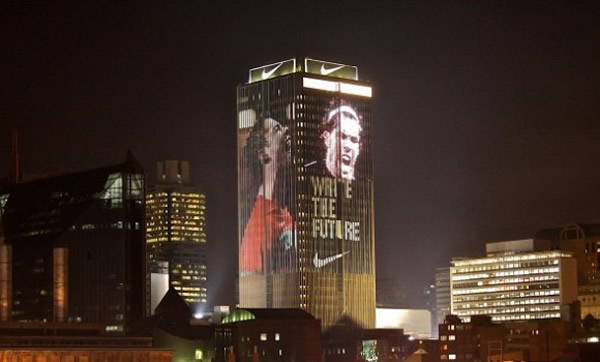

Whereas the Beijing Olympics represented an embracing of China into the coven of Westernism, the London Olympics will show us just how venal unfettered capitalism can be, how its default modus operandi is paranoia, and rather than a celebration of human endeavour and athleticism, it demonstrates more that the power of branding requires such strict parameters of control that nothing can be left to chance. Brand Exclusion Zones are just one manifestation of the privatisation of public space that London is fast-tracking. For a more thorough analysis of the much hyped legacy of London 2012, I urge you to read Anna Minton's Ground Control, recently updated to include a new chapter on the Olympics.
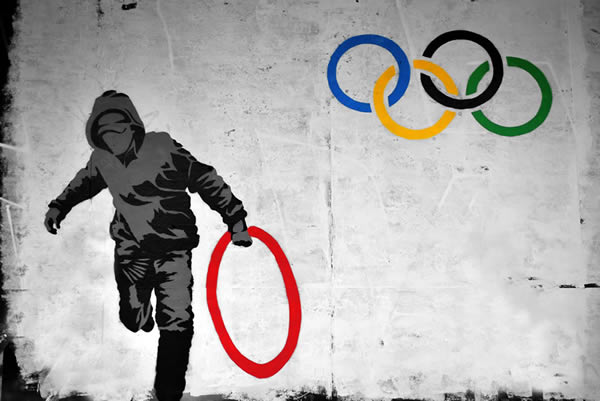
I've said it before and I'll say it again, the marketeers are way ahead of the urbanists in understanding how the city works. The spatial politics of brand paranoia will be part of the true legacy of the London Olympics.
Previously:
